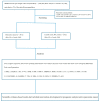Determining Optimal Cut-Off Value of Pancreatic-Cancer-Induced Total Cholesterol and Obesity-Related Factors for Developing Exercise Intervention: Big Data Analysis of National Health Insurance Sharing Service Data
- PMID: 38001704
- PMCID: PMC10670681
- DOI: 10.3390/cancers15225444
Determining Optimal Cut-Off Value of Pancreatic-Cancer-Induced Total Cholesterol and Obesity-Related Factors for Developing Exercise Intervention: Big Data Analysis of National Health Insurance Sharing Service Data
Abstract
This study aimed to examine the effects of multiple parameters on the incidence of pancreatic cancer. We analyzed data from 1,108,369 individuals in the National Health Insurance Sharing Service Database (NHISS DB; birth to death; 2002 to 2015) and identified 2912 patients with pancreatic cancer. Body mass index, systolic/diastolic blood pressure, and fasting blood glucose and total cholesterol concentrations were lower in women with than without pancreatic cancer (p < 0.01). Fasting blood glucose and total cholesterol concentrations were significantly different between men with and without pancreatic cancer (p < 0.05). In the logistic regression analysis, the total cholesterol concentration (odds ratio (OR), 1.007; 95% confidence interval (CI), 1.005-1.010) was significantly higher in men than women with pancreatic cancer (p < 0.05). Pancreatic cancer rates were highest in men who smoked for 5-9 years or more (OR, 5.332) and in women who smoked for 10-19 years (OR, 18.330). Daily intensive exercise reduced the risk of pancreatic cancer by 56% in men (95% CI, 0.230-0.896). Receiver operating characteristic curve analysis revealed a total cholesterol concentration cut-off point of 188.50 mg/dL (p < 0.05) in men with pancreatic cancer, with a sensitivity and specificity of 53.5% and 54.6%, respectively. For women, the cut-off values for weight and gamma glutamyl transpeptidase concentration were 58.5 kg and 20.50 U/L, respectively. The sex-specific differences in patients with pancreatic cancer identified herein will aid in the development of individualized evidence-based prognostic and preventive programs for the treatment of pancreatic cancer.
Keywords: National Health Insurance Sharing Service Database; big data analysis; obesity; pancreatic cancer; prevention program development.
Conflict of interest statement
The authors declare no conflict of interest. The funders had no role in the design of the study; in the collection, analyses, or interpretation of data; in the writing of the manuscript; or in the decision to publish the results.
Figures


References
Grants and funding
LinkOut - more resources
Full Text Sources
Miscellaneous

